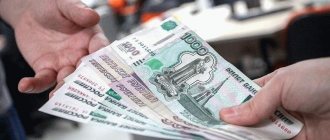Is there a tax on foreign exchange transactions in the Russian Federation?
Direct transactions with currency, cash or non-cash, are not subject to any special tax in the Russian Federation. Moreover, judging by the trends in the further formation of currency legislation in the country, we cannot expect the appearance of such a tax in the near future.
For more information about what to expect, read: “Changes in currency legislation since 2017.”
The tax on foreign exchange transactions refers to the income tax of individuals payable to the budget at the end of the past year. For example, if an individual purchased dollars at a rate of 50 rubles per dollar, and then exchanged them for rubles at a rate of 70 rubles per dollar, then this person received income in ruble equivalent. According to the current legislation, an individual must declare and pay personal income tax from such income to the budget for the year in which he made a profitable operation.
Let's look at the reasons for this.
Tax for individuals when selling currency in 2021
The future of taxes on foreign exchange transactions Against the backdrop of strong jumps in the value of the ruble and a rush among the population to buy and sell foreign currency, the government became more interested in the mechanism for paying taxes on foreign exchange transactions. Last week, Prime Minister Dmitry Medvedev instructed the Ministry of Finance to further study the issue of taxation of sales of foreign currency, since the administration of foreign currency tax is difficult to carry out. Among the reasons for such interest, it was noted that the measure would reduce pressure on the ruble in times of crisis. The Ministry of Finance, in turn, explained that “tax calculation and payment are carried out by the taxpayer independently on the basis of a tax return submitted to the tax authority at the end of the tax period.” And citizens are required to independently monitor their own tax obligations.
What is the essence of taxation of income from currency exchange
The grounds for paying tax in case of receiving income from currency exchange are as follows:
- clause 1 art. 228 of the Tax Code of the Russian Federation obliges the payer (individual) to pay tax (personal income tax) on income related to the sale of property;
- clause 2 art. 38 of the Tax Code of the Russian Federation establishes: what is property should be determined according to the norms of the Civil Code of the Russian Federation;
- Art. 141 of the Civil Code of the Russian Federation, in turn, determines: in what should be classified as property expressed in currency values, one must be guided by the norms of legislation on currency regulation;
- and finally, paragraph 1 of Art. 1 of the Law “On Currency Regulation” dated December 10, 2003 No. 173-FZ classifies currency as property.
Thus, having gone through the entire logical chain, we establish: transactions of individuals selling foreign currency with profit should be subject to personal income tax. Consequently, when selling currency, an individual acquires the obligation to report such sale to the Federal Tax Service and pay tax if he receives income from the transaction.
These conclusions were repeatedly confirmed by the Ministry of Finance in its letters. As an example, let us indicate the letter dated February 20, 2015 No. 03-04-06/8370.
Read more about this: “Will a tax be introduced on foreign exchange transactions?”
Practical application of “currency” personal income tax in 2016–2017
Despite its solid theoretical justification, this rule does not work in practice. At least for now.
There are several reasons for this:
- There is no specific procedure for accounting for foreign exchange income when calculating the taxable base for personal income tax that is understandable to “ordinary residents.” At the same time, most citizens are not experts in the Tax Code of the Russian Federation in order to correctly calculate the base and tax according to general standards (even if they know about the need to calculate tax when selling currency).
- The Federal Tax Service does not have tools to monitor the activities of citizens in the purchase and sale of currency. In the vast majority of cases, if a citizen himself does not come to the Federal Tax Service with a declaration that includes income from currency exchanges, then the tax authorities have no way to find out about it.
- From the point of view of the application of the Tax Code of the Russian Federation and the above conclusions, questions also remain. For example, in Art. 217 of the Tax Code of the Russian Federation there is a provision that transactions with property that has been owned by an individual for more than 3 years are not taxed. It is quite difficult to confirm or deny the fact of ownership of foreign currency funds for a certain period of time; a person could collect the exchanged amount for years (for example, to buy a home). How to calculate tax correctly in this case? Or how to force a citizen to inform the tax office about such situations, which will probably offer to pay personal income tax on the entire amount?
So, in most cases, Russian individuals do not seek to declare and pay “currency” personal income tax, and the Federal Tax Service does not have the ability to identify such defaulters. Payment of tax is possible in situations where a currency exchange transaction is documented and subject to verification (for example, a non-cash exchange of a large amount in an individual’s bank accounts) or when personal income tax on currency-related transactions is withheld by a tax agent (for example, when an individual issues a loan to an enterprise in foreign currency ).
For information on withholding personal income tax in such cases, see the article “Loan in foreign currency: is the positive difference subject to personal income tax?”
Tax on the dollar: is it possible not to pay personal income tax legally?
This measure was introduced only in 2021, as a large number of citizens, due to the crisis, began to try to make money on exchange rate fluctuations or manage to sell dollars at the maximum price. In total, individuals most often pursued three goals:
- accumulation of money;
- obtaining speculative income (if transactions are carried out on exchanges, for example, Forex);
- converting funds for purchases on foreign websites or when traveling abroad.
During the crisis, transactions with a second goal - generating income - began to be carried out more and more often, which is why government authorities decided to equate sales of currency to the sale of other types of property.
Results
As such, there is no tax on currency exchange transactions in the Russian Federation yet. The legal norms imply the obligation of resident individuals to declare and pay personal income tax on transactions with currency, if income was received as a result of such transactions. But in practice, this norm has not yet been practically implemented, since there is no working procedure for calculating, paying and confirming personal income tax amounts from transactions with currency, and there is also no control mechanism for the implementation of this norm by the Federal Tax Service.
NOTE!
For the purposes of this article, “resident of the Russian Federation” should be understood as “tax resident of the Russian Federation,” since we are talking about taxation according to the norms of the Tax Code of the Russian Federation. You can find more complete information on the topic in ConsultantPlus. Free trial access to the system for 2 days.
Legislation on foreign exchange transactions
At the moment, anyone can buy or sell currency in several ways
:
- at the bank at a special rate for the client or on a general basis;
- at an exchange office: online or in a separate branch of the bank;
- on the foreign exchange market.
However, not all of these methods are legal.
Buying, selling and exchanging currency at a bank
The bank is essentially an intermediary between the state and individuals/legal entities. Currency transactions carried out through them are reflected in the general banking register.
By the way, recently the Central Bank revoked the licenses of some banks and exchange offices due to failure to comply with legislation in the field of entering transactions into the general register. In other words, their currency exchange transactions were illegal.
The procedure for conducting a currency exchange transaction was developed by the government, and it is separate for each currency. The limit on transactions carried out remains common to all currencies. Currency purchases are carried out only in rubles.
So, exchange currency without confirming sources of origin
money, possible in an amount equivalent to about 10,000 US dollars (or 600 thousand rubles). A similar procedure is established when purchasing currency.
To carry out transactions for an amount less than the limit, the client only needs to provide the cashier with a passport. Then the cashier enters the data into a special program, and after completing the currency transaction, prints out a receipt. It's better to keep it.
If the amount of the currency exchange transaction was above 10 thousand dollars
USA or 600 thousand rubles, the client will have to fill out a special form (it will be provided by the cashier). In this form you need to fill out the following fields:
- FULL NAME;
- contact phone number;
- passport details;
- place of residence/registration;
- place of work;
- official income;
- a way to receive money to buy or sell currency.
The last point is considered mandatory. It must be remembered that if a client purchases currency, he must indicate where he got the money to carry out such an operation
. He may have sold property or received money as an inheritance. In this case, he should pay personal income tax from the income received from the sale (in rubles).
Banks require you to fill out a form to buy or sell currency worth more than 600 thousand rubles in order to comply with legal requirements.
on combating money laundering and terrorist financing (115-FZ).
Some banks offer to fill out a form when purchasing currency for a smaller amount, for example, 5,000 US dollars. This is not a violation of the law if such a rule is specified in the bank’s internal documents. And it is worth remembering that customer profiles should not go beyond the bank.
Buying/selling currency at an exchange office
The state is helped to control currency exchange offices by amendments to legislation adopted back in 2010, which prohibited anyone other than banks from engaging in currency exchange. That is, according to the law, a currency exchange office must belong to a bank.
Sometimes it may be more profitable for a client to carry out a currency exchange transaction through an exchanger. There are different reasons.
Firstly, they always have a sufficient amount of currency
.
Secondly, you can purchase currency even without an
identity document. But this is only if the amount does not exceed 10,000 US dollars (or 600 thousand rubles).
Thirdly, if a bank can sell only no more than $10,000 to one person without a questionnaire, several orders can be issued for one individual at an exchange office.
But this is a violation of the law
, which entails the application of penalties not only in relation to the exchange office, but also to the one who bought/sold the currency.
Conscientious currency exchange offices (that is, operating in accordance with the law) comply with the rules for conducting exchange transactions: they provide the client with a questionnaire to fill out when a transaction exceeds the established limit.
Purchasing currency on the organized foreign exchange market
If previously only experienced traders had access to the foreign exchange market of Russia or the United States, now anyone can buy and sell currency
. And for this you do not need to find an independent broker, especially since most of these companies are scammers and can “drain” the deposits of their clients.
Today, several Russian banks offer their clients brokerage services in the foreign exchange market
, among them we note the following:
- "Sberbank";
- "VTB";
- "Alfa Bank".
In a currency purchase transaction, they act as intermediaries between the currency exchange and the individual. They charge a certain fee for their activities.
(in addition to the money that will have to be given to the broker, income was received from the transaction).
To enter the foreign exchange market, you need to open an IIS (individual investment account) or a simple current account. All operations are performed online.
An individual investment account will be preferable - when using it, you can claim a tax deduction for personal income tax.










